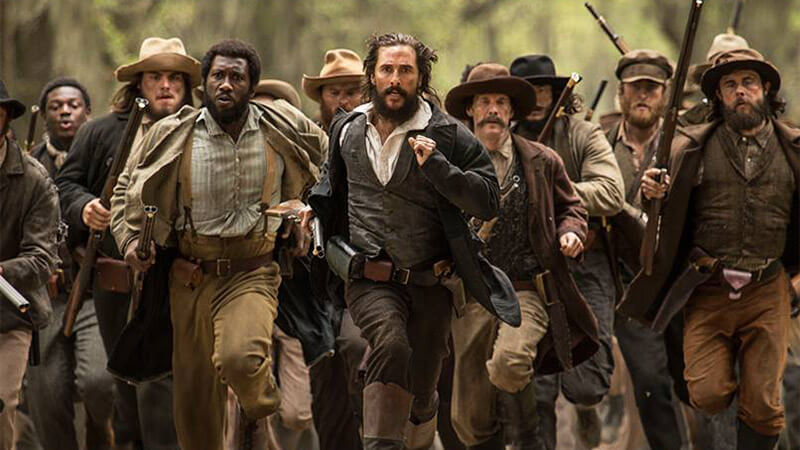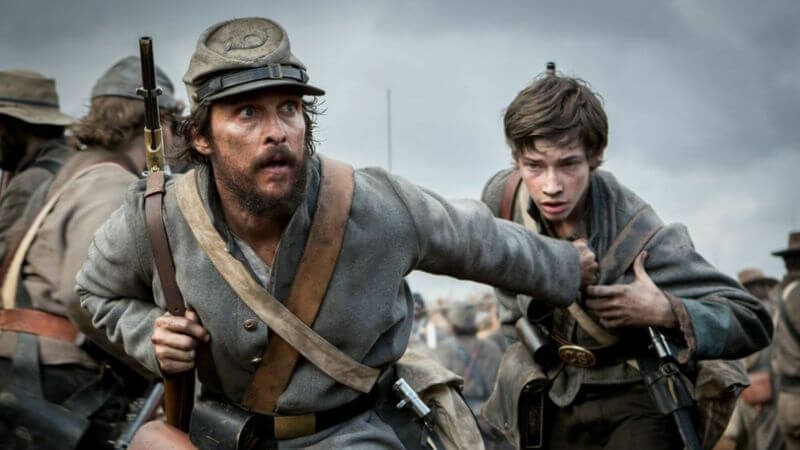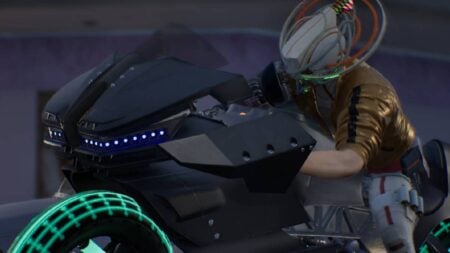Title: Free State of Jones
Release Date: June 24, 2016
Studio: STX Entertainment
Director: Gary Ross
The line between historical accuracy and Hollywood conjecture depicted in Free State of Jones is a blur. Newton Knight, who is the film’s protagonist, is somewhat of a folk legend. Little has been recorded in our nation’s records depicting his role during the 1860s. Director Gary Ross tries to combine folklore with an honest effort to spitball dates for the sake of legitimacy. The result is compelling at times and frustratingly preachy at others. All in all, this whole film is an uneven dichotomy that coasts on Matthew McConaughey’s sheer charisma.
Free State of Jones centers on Newton Knight (Matthew McConaughey), a soldier for the Confederate Army. As a poor farmer from Mississippi, he does not see the purpose in fighting to preserve the rich man’s privilege to own slaves. He deserts and goes on the run where he meets a group of freed slaves. Shortly thereafter, he introduces them to his fellow farmers to defend their farms from the Confederacy. The film also focuses on Knight’s activities following the Civil War, including his establishment of a mixed race community.
As stated earlier, Matthew McConaughey is the highlight of this film. He delivers all of his speeches with a fiery passion. McConaughey’s performance is aided by some attentive camerawork which focuses on his facial expressions. Great actors are not always the ones who rely on histrionics to convey emotion. McConaughey, who has proven time and time again his talent, conveys a lot through his eyes. With just a glance or steady camera shot, he can exude a plethora of emotions from paranoia to serenity. McConaughey is in full form but the material he is given is not quite up to snuff.

The manner in which Knight is portrayed throughout the film reaches a climax of cinematic absurdity. His actions escalate as the film progresses, eventually depicting him as a master strategist and combat aficionado. It is exciting to watch him develop his leadership skills but it requires a suspension of disbelief. Like the overly machismo action heroes of the 1980s, he appears to be invulnerable and is a one man wrecking crew. Think of John Rambo mixed with Mel Gibson’s character from The Patriot. This is an element that feels straight out of Greek Mythology and not American History. His mindset is also portrayed as being far too idealistic. While it is well documented that many Confederates did not believe in slavery did not mean any did not have any preconceived racist notions. Knight in this film seems to have none, which makes him feel inauthentic as a historical figure.
As a film that depicts the horrors of the Civil War, Free State of Jones succeeds at showing brutality. It earns its R rating without feeling too gratuitous. At the same time, outside of the first few battles which open the film, the Civil War feels more like a backdrop than a realized setting. Part of the problem can be attributed to Gary Ross’s direction. His scale subverts typical expectations: small skirmishes feel like large battles and vice versa. Compared to his restrained direction on The Hunger Games, Ross does succeed at staging the action.
Believe it or not, this film actually feels like a spiritual cousin to The Hunger Games movie franchise. Both depict a society that rewards the rich and enslaves the poor and the underprivileged. Both films are about resistance and eventually full rebellion. Given our nation’s own history, Free State of Jones is well-intentioned but rudimentary in what it attempts to say. Outside of Knight, the supporting characters do very little to expand upon his beliefs. They get by on basic ideological statements told in numerous films about this period. War is hell, slavery is immoral and freedom is a right. This begs the question: what exactly is the film trying to say? The foundation is there but it remains underdeveloped because of some narrative and storytelling decisions.

While much of the film takes place during the 1860s, a few scenes take place during the 1940s. Although they center on an ancestor of Knight on trial for interracial marriage, these scenes feel abrupt and disjointed. This subplot is a tacked on attempt to make a statement on the lack of social progress between the two periods. Much like the film in general, it makes a statement in the broadest sense. There is no attempt to make a connection between the time periods of the film and the hypocrisy of modern society. Instead, it decides to point out atrocities that everyone today should already be mortified by. Free State of Jones suffers from playing it too safe as a message film but it is a story that warrants a cinematic interpretation. Hopefully, someone down the line will take the opportunity to expand upon what was briefly examined here.
Characters: With the exception of Knight, the supporting characters feel like they are there for the sake of historical accuracy. They are used more as plot devices to give Knight someone to react off of.
Cinematography: Both historical periods depicted feel true to their respective times. The battle sequences, while inconsistent in scope, are effectively grimy and blood-soaked.
Story: By making too many basic presumptions about the subject matter, the film drags throughout. The 1940s scenes drive the narrative structure to a screeching halt every time they appear.
Acting: McConaughey delivers a great performance in the midst of some mediocre material. Ross does a good job of pinpointing his facial expressions. The supporting cast, while good, aren’t given any real character arcs to work off of.
[review]







